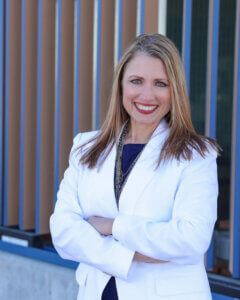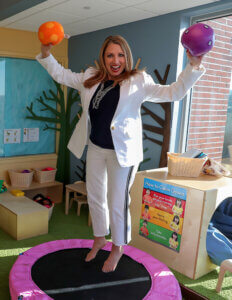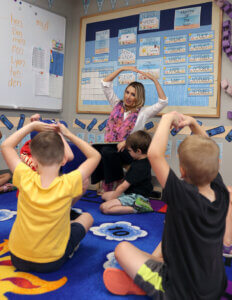
VIEW THE 2023 NEW FRONTIERS MAGAZINE FEATURING MACY AND OTHER UNK FACULTY
By TYLER ELLYSON
UNK Communications
KEARNEY – Marisa Macy was just a few weeks into her new job at the University of Nebraska at Kearney when her office telephone rang.
The man on the other end of the line – a high school science teacher and father from St. Paul – needed her help.
His daughter and several other children in the small, central Nebraska community were supposed to start preschool that fall. However, there weren’t enough spots available in the town of roughly 2,400 residents, so a group of community members decided to create a new classroom in the basement of a local church.
They encountered another issue when they couldn’t find an early childhood educator to staff the program.
“I was stunned that he was so desperate that he was just calling people randomly off the website,” said Macy, who connected him with resources and shared the opening with UNK students and graduates.
Eventually, the St. Paul group was able to hire someone to run the new preschool program there, but families in many other communities aren’t as fortunate.
“We have a critical shortage of early childhood educators in America and Nebraska, especially in rural areas,” Macy noted. “We desperately need more of these professionals.”
Ninety-one percent of Nebraska counties with child care facilities do not have enough spots available to meet the demand, and families in 11 counties don’t have access to any licensed child care programs, according to We Care for Kids, a partnership of state and community-based organizations that’s coordinated by the Buffett Early Childhood Institute at the University of Nebraska.
That’s a problem for several reasons. Quality early childhood education prepares children for success in school and life, creating a solid foundation for the future. It’s also crucial for the state’s prosperity, since a vast majority of children under age 6 live in homes where all the adults work.
Macy refers to early childhood educators as the “workforce behind the workforce.”
“We need early childhood educators so people can go to work,” she said. “People who have young children – birth to school age – need resources that allow them to enter the workforce or stay in the workforce. And early childhood educators fill that role. They’re essential for a community because they help families in so many ways.”
Without access to quality, affordable child care and early education, it’s difficult for Nebraska to attract new businesses to communities and for established businesses to hire new employees and grow. A recent survey from Nebraska Extension and We Care for Kids shows that almost a third of parents with children ages 5 and younger left the workforce because they couldn’t find affordable child care, and 74% of respondents believe a lack of quality, affordable child care and early learning is a serious problem in Nebraska.
More than 80% of those surveyed agree that Nebraskans must work together to solve this problem.
That’s where Macy and the UNK College of Education come into play.

COMMUNITY OUTREACH
A UNK faculty member since fall 2021, Macy is an associate professor in the Department of Teacher Education, where she teaches a variety of undergraduate and graduate courses to current and future early childhood educators.
The university graduated more than 20 educators with early childhood endorsements during the spring 2023 semester alone, with those professionals now supporting children and families across Nebraska.
Outside the classroom, Macy serves as UNK’s Cille and Ron Williams Endowed Chair of Early Childhood Education and the UNK Buffett Early Childhood Institute Community Chair. As an endowed chair, her work focuses on outreach and developing pathways to support early childhood educators, children and families. She creates connections between UNK, the Buffett Institute and other NU campuses, then extends those connections to communities across the state.
“As part of my role as the community chair, I think it’s so important that I’m not just sitting in my chair in my office, but that I’m out in the community,” Macy said. “I want to be out there learning how I can best serve the people in our state.”
The Seattle native calls Nebraska the best place to be a teacher, baby or young child – “because people here really care about education” – but she also knows there are obstacles to overcome. During her travels, she meets with educators, child care professionals, businesspeople, nonprofits and anyone else who wants to discuss strategies and potential partnerships.
“Each rural community is unique. They’re like fingerprints – no two are the same. But many of them have similar challenges that they’re facing,” Macy said. “When we can get together and share ideas with each other, we can learn from each other.”
Those interactions are the driving force behind a new professional development program that is launching in May.
Appropriately titled “Amore from Nebraska,” the program will take UNK graduate students and early childhood professionals from across the state on a two-week trip to Reggio Emilia, Italy, to learn about preschool education and early childhood practices there while forming a deeper bond with each other. Developed in Italy, the Reggio Emilia approach and Montessori method are student-centered educational philosophies that emphasize self-guided, hands-on learning along with social, emotional and physical development.
“People from all over the world go on delegations to Reggio Emilia to study these early childhood approaches,” Macy noted.
The goal isn’t necessarily to inspire people to implement those approaches in Nebraska, according to Macy. Instead, she’s focused on “strengthening our community of practice” by bringing people together for a shared experience.
“When you’re with other early childhood educators and professionals for two weeks doing this deep dive, you walk away inspired and you learn so much about each other’s hopes and dreams,” she said. “You come back with so many new ideas, friendships and ways of thinking about things.”
Macy, who comes from an Italian family and speaks the language, hopes to have about 10 people signed up for the trip each year.
She’s also using it as a research opportunity to determine whether this type of experience can influence a person’s career decisions.
“One of the things we’re trying to learn about is retention of the workforce,” she said. “There’s a whole line of research with university students that shows having at least one high-impact experience like this leads to higher retention and graduation rates. Maybe the same can be true for our early childhood workforce, because we have a lot of people who are leaving the field right now.”
A Buffett Institute survey examining the COVID-19 pandemic’s impact on Nebraska child care professionals shows 9 in 10 providers who employ staff have difficulty filling open positions, and two-thirds had experienced recent staff turnover, with many of those employees leaving the early childhood field entirely.

REWARDING RESEARCH
In addition to her efforts with workforce development, Macy serves as a statewide resource in early childhood assessment and developmental screening.
These are key areas, given that 90% of brain development occurs during the first five years of life.
“During the early years, there’s so much happening with a child’s development,” Macy said. “Children are exploding in terms of their development – their language development, their motor development, their social-emotional development. They’re forming new synapses in their brain every single moment.
“There’s no other time in a person’s lifespan when their development is so vulnerable, but there are also so many opportunities to shape and form outcomes.”
Macy is involved with Nurture Nebraska, which addresses children’s social-emotional needs, and Help Me Grow Nebraska, which focuses on early detection of developmental delays or disabilities. She helped develop the Ready-Set assessment tool that’s used to evaluate school readiness among 4-year-olds and is currently studying its effectiveness among Spanish-speaking families. She’s also part of a language development study at the Plambeck Early Childhood Education Center on campus.
Recently, her scholarly articles appeared in the International Journal of Community Diversity, Early Childhood Education Journal and International Journal of Early Childhood Learning. She was part of the UNK Online Faculty Research Fellowship program in 2022-23 and Nebraska Academy for Early Childhood Research Policy Fellows Program in 2021-22 and has twice received the UNK College of Education Publication Award.
“One of my goals is to have my research, my teaching and my outreach activities overlap,” Macy said. “The things I do in the community inform my teaching – I bring them back to the classroom and weave them into the lectures I have or the assignments I design. I also take the things I write and make them meaningful to students. I try to find ways to make it all blend.”
She’s also bridging the “research-to-practice gap” by sharing her knowledge and findings with early childhood educators working in the field.
“We’re making it meaningful and applicable to the people in our state,” said Macy, who never turns down an opportunity to present at a conference or attend a workshop.
“This is my dream job,” she said. “I’m really passionate about what I do, and I love supporting children and families.”
PHOTOS BY ERIKA PRITCHARD, UNK COMMUNICATIONS

MARISA MACY
Title: Associate Professor, Teacher Education; Cille and Ron Williams Chair of Early Childhood Education; Buffett Early Childhood Institute Community Chair
College: Education
Education: Ph.D. in special education with early childhood special education and early intervention, University of Oregon, 2004; Master of Science degree in special education with early childhood special education and early intervention, University of Oregon, 2000; Bachelor of Arts in English, University of Washington, 1993; Certificate in early education leadership, Harvard Graduate School of Education.
Years at UNK: Two
Areas of Research/Specialization: Authentic assessment of children birth to age 8 with and without delays/disabilities, developmental screening, play and workforce development.
Courses Taught: Assessment and Observation of Young Children, Methods of Inclusive Education Birth Through Age 3, Methods of Inclusive Education Preschool, Serving Young Children with Special Needs, Issues and Trends in Early Childhood Education, Nature and Needs of Exceptionalities
Recent Published Articles: “Rapprochement of Families, Professionals and Community: Strategic Assessment Approach for Supporting Children,” International Journal of Early Childhood Learning, 2023. “Wishful Linking: Authentic Environmental Measures Aligned with Programmatic Purposes,” Early Childhood Education Journal, 2023; “Seeking Harmony Between Antecedents, Intervening Mechanisms & Child Outcomes: Considerations for Early Childhood ‘IDEA Child Find’ Service Delivery,” International Journal of Community Diversity, 2022.






